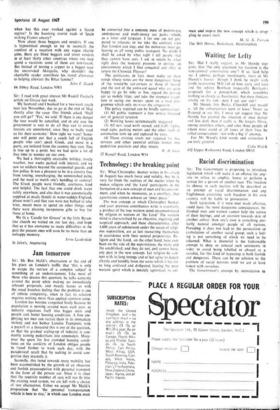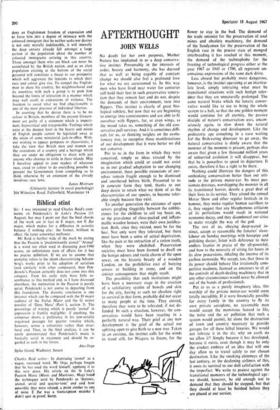Racial discrimination
Sir: The Government is proposing to introduce legislation which will make it an offence for any- one to refuse to employ, house or perform a service for a person of another race. The freedom to choose in such matters will be described as an attempt at racial discrimination and any Englishman exercising such freedom in his own country will be liable to prosecution.
Such legislation, if it were ever made effective, could have the most dangerous consequences. In- dividual men and women cannot help the nature of their feelings, and an aversion towards skin of another colour than one's own is something per- fectly natural amongst people of all nations. Providing it does not lead to the persecution or exploitation of another racial group, such a feel- ing is not something of which we need to be ashamed. What is shameful is the fashionable attempt to deny or conceal such sentiments in order to avoid being labelled or abused as a racialist, for this kind of hypocrisy is both foolish and dangerous. There can be no solution to the problem of racial tensions until we are at least honest with ourselves.
The Government's attempt by intimidation to
deny an Englishman freedom of expression and to force him into a degree of intimacy with the coloured immigrant that he neither seeks nor desires is not only morally indefensible, it will intensify the deep anxiety already felt amongst a large section of the population about the number of coloured immigrants arriving in this country. Those amongst them who are black can never be assimilated by the British nation, and as an alien population existing at the bottom of the social pyramid will constitute a threat to our prosperity which will aggravate the tensions to which their race and colour give rise. To compel the English- man to share his country, his neighbourhood and its amenities with such a group is to push him beyond the limits of toleration in a manner which may well result in expressions of violence. The freedom to avoid what we find objectionable is one of the most precious of individual liberties.
In asserting that by decree there is to be no colour in Britain, members of the present Govern- ment are guilty of a statement which is imperti- nent, hypocritical and irresponsible. Feelings which exist at the deepest level in the hearts and minds of English people cannot be legislated away at the whim of some ministerial jack-in-office. With- out wishing to appear pompous or chauvinistic. I take the view that British men and women are the custodians of a country and a heritage which they are under no obligation to share with just anyone who chooses to settle in these islands. My I therefore appeal to your readers of whatever race, creed or colour to do everything possible to prevent the Government from compelling us to think otherwise by an extension of the already invidious race laws.
James Mottram (University lecturer in social psychology) 364 Wilmslow Road, Fallowfield, Manchester 14 .































 Previous page
Previous page